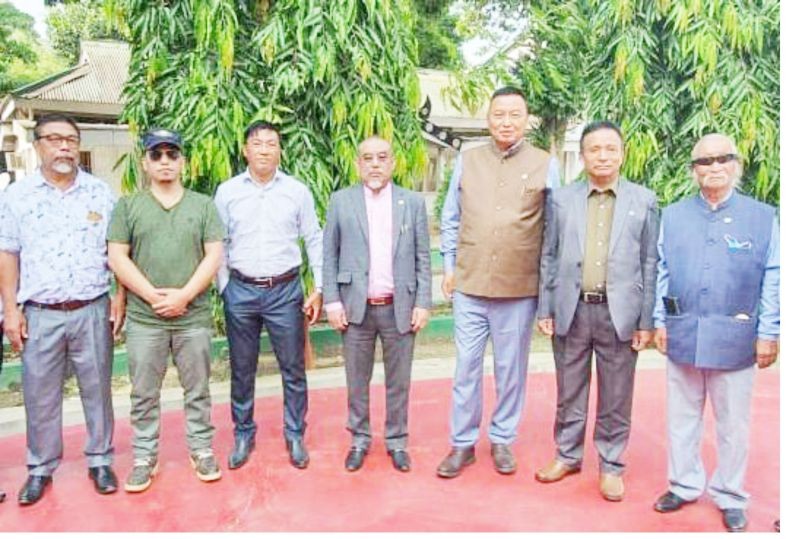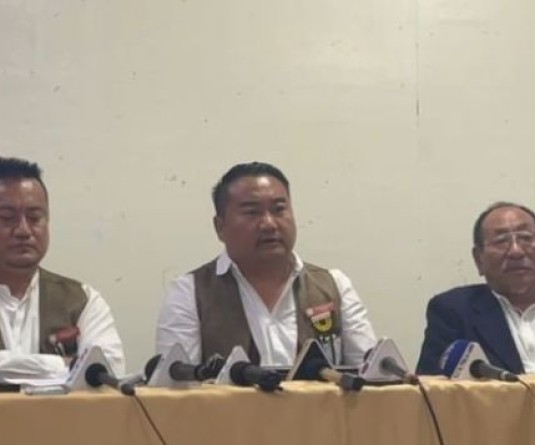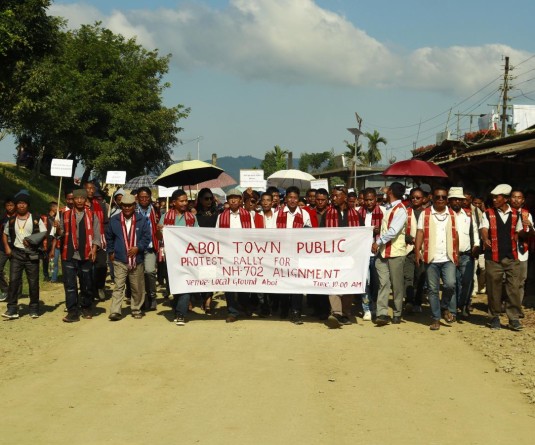A file photo of the members of the Working Committee, Naga National Political Groups.

Dimapur, June 25 (MExN): The Working Committee, Naga National Political Groups (WC, NNPGs) on Friday said that the Framework Agreement document was “haphazard and historically inaccurate,” as it states that the Indo-Naga political struggle is about six decades.
Stating this in a press release issued through its Media Cell, the WC, NNPGs said that in 1918, the Naga Labour Corps (NLC) who had returned from Europe after assisting the Allies in the WWI, returnees imagined the concept of Naga nationalism. The formation of Naga Club in 1918 aroused the spirit of political activism and nationalism, which culminated into submitting of memorandum to British Statutory Commission in 1929, and by 1947, “it was crystal clear, the political struggle had begun.” The press release was appended by Convener N Kitovi Zhimomi and Co-conveners Zhopra Vero, Y Wangtin Naga, Z Hozheto Chophy, Kiumukam Yimchunger, Toshi Walling, and Isak Sumi.
However, it said that the opening lines of the August 3, 2015 Framework Agreement signed between the Government of India (GoI) and the NSCN (IM)—“The Indo-Naga political struggle is about six decades...” put a damp blanket upon four eventful decades of Naga political struggle. The WC, NNPGs went on to say that history would not blame the entire NSCN (IM) set up for the ‘debacle,’ “because it was orchestrated by a group within the leadership” who joined the Naga political movement circa 1955 and were not part of the Naga Club, nor signatory to Simon Commission or engaged in the August 14, 1947 event or the 1951 plebiscite.
“Naturally, Naga political struggle, to them is six decades or less, counting from 1955 to FA 2015. They knew their chronology well and did not go beyond sixty years,” it said.
“The FA document is therefore haphazard and historically inaccurate. It collapses on its own weight of distortion and contradictions. It cannot stand the test of history,” it added.
Stating that Naga history neither resides in one paper nor is owned by a group of people, the WC, NNPGs termed the NSCN (IM)’s recent declaration to enforce and continue imposing taxing on Naga people as “senseless, contemptuous and an insult to heavily burdened Nagas in Nagaland.” It accused the NSCN (IM) of having a mindset and policy that is fixed on destroying Nagaland economically, culturally and socially, and criminalising the Naga cause after twenty four years of “chameleon-like narrative.”
It said that while the British forcefully imposed and collected tax on Nagas without any regret or remorse because they foresaw no future in the Indian subcontinent, after the formation of the NNC in 1946, “it became the bounden duty of every household to contribute voluntarily to the Naga movement.” It also said that the 1951 plebiscite was a clarion call to all Nagas to be aware of their historical rights in their respective domains and it was an unwritten agreement among tribes and villagers that voluntary contribution and donation towards the political movement would be sought and granted. However, it said, today the “Naga plebiscite is cited like a licence, a bus ticket for many to travel to Nagaland and threaten, intimidate, blackmail and take advantage of the generosity of the tribes.”
“1951 Plebiscite establishes Naga ethnicity in principle. It, however, cannot be misinterpreted to ignore current political and administrative boundaries, artificial or otherwise, to destroy the livelihood of our people through forceful taxation,” it asserted.
On the matter of ‘Naga integration,’ the WC, NNPGs stated that the GoI has ruled out Naga Integration at present and the same was admitted by Th Muivah on February 29 at the Agri Expo Grounds in Dimapur. “GoI and WC, NNPGs have agreed that Naga integration would be pursued democratically post solution. For this, each NNPG has reviewed and formulated its own no taxation policy outside Nagaland state,” it added.
It said that the Agreed Position signed between the GoI and WC, NNPGs on November 17, 2017 was a reaffirmation and extension of 1951 plebiscite, based on which, a status paper is available and all Naga tribes and civil societies have been briefed on the political structure of impending solution.
It claimed that the Agreed Position “corrected the historical and political blunder and vacuum created by FA when GoI Interlocutor RN Ravi, who had earlier signed FA in 2015 with IM, recognised, ‘...the right of the Nagas to self determine their future in consonance with their distinct identity...’ while all matters would be resolved with due regard to contemporary political realities.” This has allowed the WC, NNPGs to meet neighbours like Meiteis, Kukis and Ahoms and begin the healing process in the neighbourhood.
The WC, NNPGs, it said, is the child of the Naga tribes and civil societies and does not believe in threats and intimidations. “As long as WC, NNPGs and GoI work on to finalise honourable and acceptable political solution for future Naga generations, the pledge and spirit of 1951 plebiscite will guide our people to assist and sustain the movement,” it added.
It further advised those claiming legitimacy of Naga cause not to teach the tribes of Nagaland the history of their struggle or the political movement their fathers and grandfathers established, to refrain from talking about historical events that they did not take part in, stating that they had no moral right or authority to do so.





